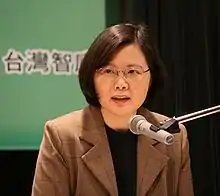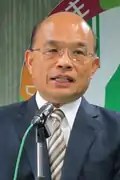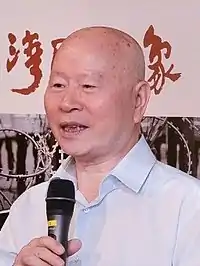2011 Democratic Progressive Party presidential primary
The 2011 Democratic Progressive Party presidential primary was the selection process by which the Democratic Progressive Party of the Republic of China (Taiwan) chose its candidate for the 2012 presidential election. The DPP candidate for president was selected through a series of nationwide opinion polls held on 25–26 April 2011.
 | |||||||||||||
| |||||||||||||
| |||||||||||||
| |||||||||||||
Timing
Primary registration was held between 21–25 March.[1] Four TV presentations were held on April 9, 13, 16 and 20 where the candidates outlined their visions and answered questions from experts and citizens. Unlike the practice in other countries, no actual debate was held.[2] Opinion polling will be between 25–29 April and the primary is expected to wrap up on May 4.[3]
Candidates
Former Vice President Annette Lu Hsiu-lien formally announced her candidacy on February 28, 2011, the 64th anniversary of February 28 Incident.[4] She withdrew her candidacy on 22 March.[5] It is unclear whether she would quit the party and run as an independent.
Chairwoman Tsai Ing-wen announced her candidacy on 11 March.[6] Tsai is supported by former president Chen Shui-bian, former premiers Frank Hsieh Chang-ting and Yu Shyi-kun plus various pro-independence groups.[7][8][9]
Former premier Su Tseng-chang officially announced his candidacy a few hours after Lu withdrew on 22 March.[10]
Former DPP chairman Hsu Hsin-liang is also running.[11] Hsu ran unsuccessfully for the president in 1996 and 2000. He advocates "advance boldly to the west" (大膽西進) and wants to maximise Chinese capital, students and tourists coming to Taiwan.
Opinion polls
The DPP primary is carried out in the form of opinion polls.[12] Opinion polls are of the "comparative" form, where polled persons would be asked who would they support if the candidates were Ma and Tsai; if the candidates were Ma and Su; or if the candidates were Ma and Hsu. The polling was performed by five companies each calling 3000 people. The population consists of 4.27 million telephone numbers that are at least one year old. The chance of getting polled is around one in three hundred.
Candidates who poll below Ma would be eliminated and the remaining candidates with the highest rating would be nominated.[13][14] If all candidates rate below Ma, the person with the highest rating would be nominated. In the event of a tie, the winner would be the person who either defeated Ma by the most or trailed him by the least based on the gap between the candidates’ ratings and Ma’s.
The form of polling caused some controversy. If someone say they prefer all three DPP candidates over Ma, it would cancel out have no effect on the outcome. "The goal of the primaries is to choose one from three. If voters support all three candidates, it defeats the purpose of the poll", Frank Hsieh Chang-ting was quoted as saying.[15]
Some fans of Tsai therefore called on her supporters to only support Tsai in the polls, and tell the pollster they prefer Ma when asked about the other two candidates.[16] Members of the Su camp were furious about this, calling it a "dirty trick" (詐術).[17] Tsai distanced herself from this, telling her supporters to campaign positively.[18]
Also, there is concern KMT supporters would skew the results by deliberately supporting a weaker candidate like Su when polled.[19]
On the first day of the official polls, DPP member Yang Hui-ju (楊蕙如) disclosed some survey numbers on her microblogging site. She claimed Tsai’s campaign spokesperson Juan Chao-hsiung (阮昭雄) was the source.[20] Juan denied on the next day and Yang publicly apologized for her behavior.[21]
Tsai's sexual orientation
Tsai is a 54-year-old unmarried woman with no known boyfriend. Former DPP chairman Shih Ming-teh called for her to "proudly come out of the closet" like Iceland Prime Minister Johanna Siguroardottir in order to make Taiwan more progressive. Shih said that under Taiwan laws, only the opposite-sex spouse of the President is regulated and there would be no way to monitor if the same-sex partner of Tsai is taking bribes.[22] Shih's comments were strongly criticized by both KMT and DPP politicians, women's groups and gay rights groups.[23] Tsai said she is not angry at Shih, but she would not respond to him, because to do so would make her "an accomplice of gender oppression". Tsai said she would strive to eliminate gender oppression in Taiwan and lead the country toward a pluralistic, inclusive society that respects human rights.[24]
Result
| Pollster | DPP | Spotting | MSRC | ADSRC | ERA | Average | ||||||
| Candidate | DPP | KMT | DPP | KMT | DPP | KMT | DPP | KMT | DPP | KMT | DPP | KMT |
| Tsai | .4116 | .3623 | .4335 | .3345 | .4311 | .3381 | .4293 | .3587 | .4197 | .3586 | .4250 | .3504 |
| Su | .4242 | .3323 | .4106 | .3258 | .4087 | .3344 | .4200 | .3449 | .3941 | .3522 | .4115 | .3379 |
| Hsu | .1170 | .5244 | .1292 | .4908 | .1158 | .5118 | .1363 | .5199 | .1120 | .5254 | .1221 | .5145 |
References
- 民進黨總統提名人 5月4日公告. The Liberty Times (in Chinese). 24 February 2011. Retrieved 27 April 2011.
- Chen Yi-wei; Emmanuelle Tzeng; Wen Kuei-hsiang; Christie Chen (9 April 2011). "DPP presidential hopefuls cautious on China in first TV session". Central News Agency. Retrieved 10 April 2011.
- Vincent Y. Chao (7 April 2011). "DPP heads to primary, as three candidates persevere". Taipei Times. Retrieved 10 April 2011.
- Vincent Y. Chao (1 March 2011). "DPP's Annette Lu formally launches presidential bid". Taipei Times. Retrieved 10 April 2011.
- Vincent Y. Chao (23 March 2011). "Annette Lu drops bid for DPP's nomination". Taipei Times. Retrieved 10 April 2011.
- Vincent Y. Chao (12 March 2011). "Tsai Ing-wen officially launches presidential bid". Taipei Times. Retrieved 10 April 2011.
- "Chen Shui-bian says Tsai has best chances for 2012". The China Post. 12 February 2011. Retrieved 10 April 2011.
- Chen Wen-shing (19 March 2011). "Hsieh rules himself out as DPP presidential candidate". Want China Times. Archived from the original on 5 February 2013. Retrieved 10 April 2011.
- "DPP's Tsai rejects calls to alter party's election rules". The China Post. 19 March 2011. Retrieved 10 April 2011.
- Vincent Y. Chao (23 March 2011). "Su announces presidential bid". Taipei Times. Retrieved 10 April 2011.
- Vincent Y. Chao (26 March 2011). "Third candidate vies for DPP ticket". Taipei Times. Retrieved 10 April 2011.
- 民進黨總統初選民調25日晚6:30開始進行 接到機率1/300. NOWnews (in Chinese). 25 April 2011. Retrieved 27 April 2011.
- Wang Pei-lin (24 April 2011). "DPP presidential primary poll to begin tomorrow". Taipei Times. Retrieved 27 April 2011.
- "2011 DPP Presidential Primary Polling Process". Retrieved 27 April 2011.
- Vincent Y. Chao (14 April 2011). "Question of single candidate support clouds DPP poll". Taipei Times. Retrieved 27 April 2011.
- "Frank Hsieh denies fraud in DPP presidential preliminary". The China Post. 16 April 2011. Retrieved 27 April 2011.
- 前立委陳金德:謝系耍詐術 排蘇暗助蔡. China Times (in Chinese). 15 April 2011. Retrieved 27 April 2011.
- 網友喊投「蔡馬馬」 蔡英文籲理性 (in Chinese). Formosa TV. 23 April 2011.
- 台民進黨初選藍營拱蘇抑蔡 [DPP primary: KMT supports Su, suppress Tsai]. 亞洲週刊 Yazhou Zhoukan (in Chinese). 10 April 2011.
- "DPP candidates troubled by poll leak". Taipei Times. 27 April 2011. Retrieved 27 April 2011.
- "楊蕙如泣訴:私人對話被公開". udn.com. 26 April 2011. Retrieved 27 April 2011.
- "謎樣的總統候選人". Apple Daily.
- "籲蔡公佈性向 朝野轟施無聊 Government and opposition legislators blast calls for Tsai to reveal her sexuality". FTV news.
- "DPP chairwoman brushes off homosexual jibe". Focus Taiwan News Channel. Archived from the original on 24 April 2011.


